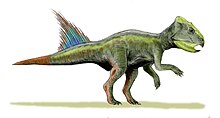Archaeoceratopsidae
|
Archaeoceratops Temporal range: Early Cretaceous, 125 Ma |
|
|---|---|
 |
|
| A. oshimai | |
| Scientific classification | |
| Kingdom: | Animalia |
| Phylum: | Chordata |
| Class: | Reptilia |
| Clade: | Dinosauria |
| Order: | †Ornithischia |
| Suborder: | †Ceratopsia |
| Infraorder: | †Neoceratopsia |
| Family: | †Archaeoceratopsidae |
| Genus: |
†Archaeoceratops Dong & Azuma, 1997 |
| Species | |
Archaeoceratops, meaning "ancient horned face", is a genus of basal neoceratopsian dinosaur from the Early Cretaceous (Aptian stage) of north central China. It appears to have been bipedal and quite small (about 1 meter long) with a comparatively large head. Unlike many later ceratopsians it had no horns, possessing only a small bony frill projecting from the back of its head.
Two specimens were found in the Middle Gray Unit of the Xinminbao Group, Gongpoquan Basin of the Mazong Shan area of Gansu Province, north central China. The type species, A. oshimai, was named by Dong Zhiming and Azuma in 1997. It is the first basal neoceratopsian discovered in this area.
The type specimen, IVPP V11114, consists of a partially complete skeleton including skull, caudal vertebrae, pelvis, and most of a hind foot. The second specimen (paratype), IVPP V11115, consists of an incomplete skeleton with a relatively well preserved caudal series, a partial hind limb, and a completely preserved foot. It is slightly smaller than the holotype.
Archaeoceratops belonged to the Ceratopsia (the name is Greek for "horned face"), a group of herbivorous dinosaurs with parrot-like beaks which thrived in North America and Asia during the Cretaceous Period. In 1997 Dong and Azuma placed it in a new family, Archaeoceratopsidae.
...
Wikipedia
